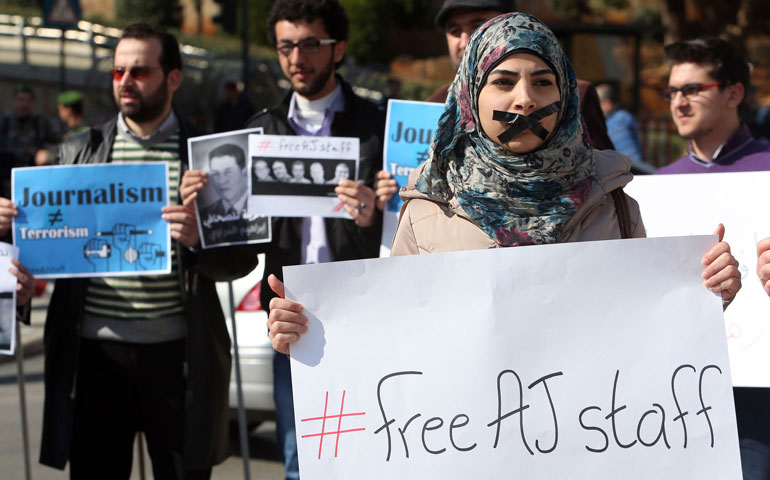
In Beirut Feb 8, a woman protests against the detainment of Al Jazeera journalists in Egypt. (Reuters/Hasan Shaaban)
Since the military coup in Egypt against the unpopular but democratically elected government of Mohammed Morsi last July, more than 1,000 regime opponents have been killed, thousands more have been hauled before military courts on political charges, and a repressive anti-protest law has been enacted, severely limiting the right of peaceful assembly. The targets of this crackdown have not just been supporters of the ousted Muslim Brotherhood government, but liberal secular activists whose calls for democracy and social justice have put them at odds with both the Islamists and the military leadership.
A new constitution written by military appointees came before voters in mid-January. The junta claimed a 98 percent vote in favor. However, those campaigning against it were subjected to beatings and arrest and only favorable reports on the constitution were allowed in the Egyptian media. The turnout was only 37 percent.
A growing number of prominent trade union activists and human rights supporters have been imprisoned, including Ahmed Maher and Mohamed Adel, who co-founded the secular, left-leaning April 6 Youth Movement in 2008 and were among the most prominent figures in the nonviolent uprising against dictatorial President Hosni Mubarak three years later. Both have been sentenced to three years in prison.
In addition, 20 Al Jazeera employees, including its bureau chief (a Canadian citizen) and veteran correspondent Peter Greste (an Australian), have been arrested under charges of "assisting a terrorist group" and "fabricating news" amid claims that they had "altered and modified video scenes" showing government repression. In effect, the military government has now criminalized journalism that doesn't fit the government's line. Meanwhile, pro-regime thugs have assaulted a growing number of other reporters.
The paranoia of the U.S.-backed regime is remarkable. Authorities have detained a stork that had been fitted by an ornithologist with a tracking device, suspecting it was being used for spying, and have investigated a hand puppet from a popular children's television show on suspicions that it was sending coded messages for oppositionists.
In a similar vein, interviews and articles have recently appeared in pro-government papers and television stations alleging various plots involving U.S.-based human rights groups, American scholars and educational foundations researching strategic nonviolent action, and Serbian veterans of the 2000 pro-democracy struggle against Slobodan Milosevic, among others. The reports allege the various groups are conspiring with the U.S. government and Egyptian pro-democracy activists to weaken the nation in the service of Western imperialism.
The articles and broadcasts have falsely accused a wide range of individuals and organizations that struggled against the Mubarak regime of working with Washington on a "new Middle East plan" for U.S. domination. Under such headlines as "April 6 behind an American plan to empower Muslim Brotherhood in Egypt," the regime has insinuated that the United States planned, instigated and funded the nonviolent resistance tactics that Egyptians used so effectively three years ago and in subsequently challenging military rule.
Ironically, the youthful oppositionists being targeted by the regime are decidedly leftist and anti-imperialist in orientation. The key organizations responsible for the 2011 uprising -- Kefaya and the April 6 movement -- grew out of student groups organized in opposition to the 2003 U.S. invasion of Iraq. Many of these activists saw Mubarak and his military allies as essentially American puppets, kept in power for decades in part by more than $1.7 billion in annual U.S. military and economic assistance. Though there was a conscious effort by organizers to minimize anti-American rhetoric so as not to bolster U.S. support for the besieged Mubarak regime, strident criticisms of U.S. support for the dictatorship and for neoliberal economic policies were evident in Tahrir Square and around the country.
Similarly, many of these activists were among the leaders of the nonviolent uprising early last summer against the increasingly autocratic government led by the Muslim Brotherhood, an uprising that prompted the coup. Efforts to tie them to Islamists are as bizarre as efforts to tie them to the United States.
During the Cold War, right-wing governments would routinely accuse progressive democratic oppositionists of being willing tools of Moscow with the aim of establishing Soviet-style communism in their country and throughout the world. With no Soviet Union and very little communism to worry about, today's autocrats are forced to put the blame on the world's only remaining superpower, even when they themselves depend on American largesse.
There are certainly legitimate criticisms of U.S. policies in the Middle East. In Egypt, however, the Obama administration is simultaneously being falsely accused by the military regime of bringing the Muslim Brotherhood to power, and by the Muslim Brotherhood of being behind the military coup that ousted it.
By claiming that the secular pro-democratic left -- which has long opposed the policies of both Washington and the Muslim Brotherhood -- is somehow in cahoots with both of them to undermine the nation, the Egyptian military is trying to have it both ways: appealing to the foreign policy establishment in Washington by suppressing the Islamists and the left, while playing the pseudo-nationalist card for the Egyptian masses.
Just as the regime's crackdown was escalating in January, Congress approved an additional $1.5 billion in military assistance to Egypt. Though U.S. law prohibits aid to any regime that overthrows a democratically elected government through a military coup, congressional leaders of both parties inserted language stating that aid could flow, "notwithstanding any provision of law restricting assistance for Egypt."
The Egyptian military clearly has the upper hand at this time, but their hold on power is ultimately fragile. The younger generation of Egyptians will not likely be satisfied with military rule any more than they were with Mubarak or the Muslim Brotherhood. And they, more than most people living under authoritarianism, know the power of strategic nonviolent action in bringing down an entrenched repressive regime.
[Stephen Zunes is a professor of politics and coordinator of Middle Eastern studies at the University of San Francisco.]

